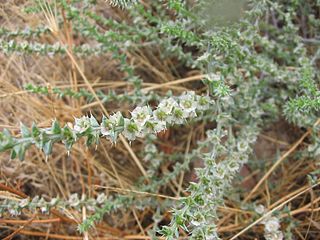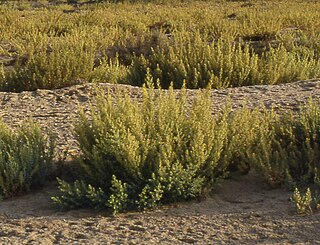
The Salsoloideae are a subfamily of the Amaranthaceae, formerly in family Chenopodiaceae.

Salsola is a genus of the subfamily Salsoloideae in the family Amaranthaceae. The genus sensu stricto is distributed in central and southwestern Asia, North Africa, and the Mediterranean. A common name of various members of this genus and related genera is saltwort, for their salt tolerance. The genus name Salsola is from the Latin salsus, meaning "salty".

Kali was a genus of plants in the subfamily Salsoloideae in the family Amaranthaceae, that has now been subsumed into the genus Salsola.

Anabasis is a genus of plants in the subfamily Salsoloideae of the family Amaranthaceae. It is distributed in southern Europe, North Africa, and Asia.

Bienertia is a flowering plant genus that currently is classified in the family Amaranthaceae s.l.. For long time, the genus was considered to consist only of one species, Bienertia cycloptera, but in 2005 and 2012, two new species have been separated.

Caroxylon vermiculatum, commonly known as Mediterranean saltwort, is a perennial plant in the family Amaranthaceae. It has many synonyms, including Salsola vermiculata and Nitrosalsola vermiculata. It is native to arid and semi-arid regions of the Middle East, North Africa and southern Europe where it is used as a fodder plant for livestock.

Caroxylon is a genus of shrubby flowering plants in the family Amaranthaceae, found in drier areas of the Old World, including southern Africa, Madagascar, northern Africa, Mediterranean islands of Europe, the Canary Islands, Socotra, Ukraine, Russia, western Asia, Central Asia, India, western and northern China, and Mongolia.
Strigosella is a genus of flowering plants belonging to the family Brassicaceae.
Xylosalsola is a genus of flowering plants belonging to the family Amaranthaceae. Its native range is Southern European Russia to Mongolia and Pakistan. Its species include:
Spryginia is a genus of flowering plants belonging to the family Brassicaceae.
Calymmatium is a genus of flowering plants belonging to the family Brassicaceae.

Climacoptera is a genus of flowering plants belonging to the family Amaranthaceae.

Cryptospora is a genus of flowering plants belonging to the family Brassicaceae.
Salsola melitensis is an endemic vascular plant of the Maltese archipelago. Its generic name is derived from the Latin word “salsus” which means salty, attributing to the salt tolerant nature of the species within this genus. The genus name was published in 1753 in the Species Plantarum composed by Carl Linnaeus but was reclassified again by Akhani et al. in 2007.
Kaviria is a genus of flowering plants belonging to the family Amaranthaceae.

Pyankovia is a genus of flowering plants belonging to the family Amaranthaceae.
Oreoloma is a genus of flowering plants belonging to the family Brassicaceae.

Halimocnemis is a genus of flowering plants belonging to the family Amaranthaceae.

Hammada is a genus of flowering plants belonging to the family Amaranthaceae. It is also in the Salsoloideae subfamily. Although it is a very unclear and unsorted genus with many species that have later been classed as synonyms.

Soda is a genus of plants in the family Amaranthaceae; its native range southern and eastern Europe including the Mediterranean, the Sahara region of Africa, Socotra, to India and Mongolia.











